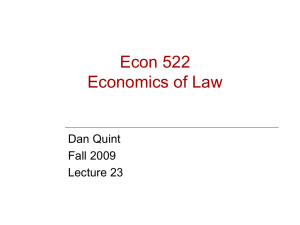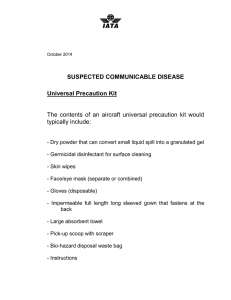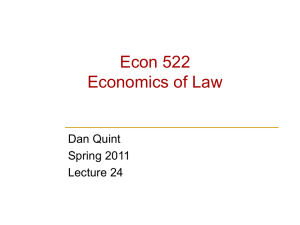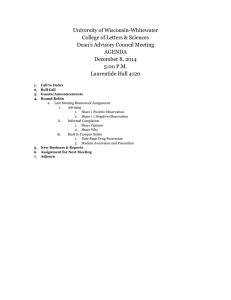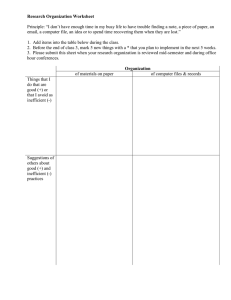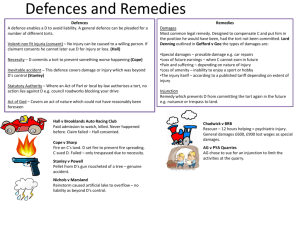Econ 522 Economics of Law Dan Quint Spring 2010
advertisement
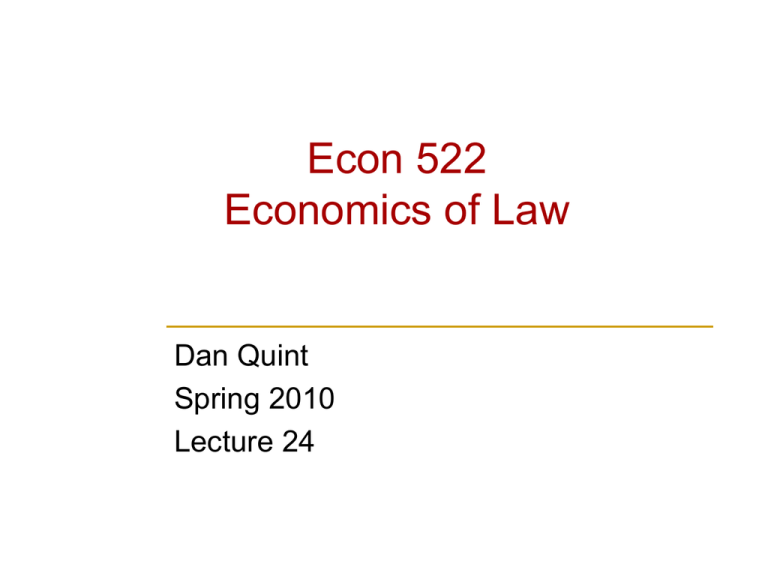
Econ 522 Economics of Law Dan Quint Spring 2010 Lecture 24 Logistics HW3 due Friday at 5 p.m. Next week: Monday – Fran’s review session Wednesday – I’ll do practice problems Final: Monday May 10 2:45-4:45, Van Vleck B130 Cumulative, more weight on second half of semester 1 Efficiency revisited 2 What have we done this semester? Efficiency Property law: efficient allocation of rights/resources Coase Theorem says this is easy… Contract law: efficient breach, efficient reliance, efficient disclosure of information, etc. Tort law: efficient precaution to avoid accidents, efficient levels of risky activities Civil and criminal law: minimize combined cost of administering system and living with its errors With each branch of law, we asked: What would efficient system look like? How do the rules in place measure up? 3 The focus on efficiency has made our lives much easier We could focus on final outcomes only No worries about process, procedural fairness, etc. We could ignore transfers when considering efficiency Paying damages has no effect on efficiency ex-post So we can ignore the “direct” effect of most remedies, consider only the impact on incentives Goal was always to maximize total social surplus (or total wealth) 4 This leads us back to two questions Is efficiency the right goal for the law? Should we expect the common law to naturally tend toward efficiency? 5 Is efficiency the right goal for the law? Posner Once you’ve already been hit by a car, you’d prefer a strict liability rule to a negligence rule But if a negligence rule is more efficient… …then we’d all have agreed to it ex-ante (before the accident) “Ex-ante compensation” / “ex-ante consent” Expected payoff, injurers Expected payoff, victims Expected payoff if you don’t know which one you’ll be Strict liability rule -100 0 -50 Negligence rule -20 -60 -40 6 Is efficiency the right goal for the law? Even if people are asymmetric… Consider a law: landlords must pay for heat Tenants get $1000 value from apartment, minus rent Landlords pay $100 for heat, $600 in other costs Without this law, tenants would pay their own heat Would heat apartment less, get $980 value and pay $60 for heat Might think tenants would prefer inefficient tenant-friendly law… But rents are set competitively, would go up to compensate… Posner: “everyone would prefer the efficient law” Landlord pays for heat Tenant pays for heat Tenants’ payoffs Landlords’ payoffs Tenants Landlords 1000 – rent rent – 600 – 100 1000 – 850 = 150 850 – 600 – 100 = 150 980 – 60 – rent rent – 600 980 – 60 – 760 = 160 760 – 600 = 160 7 Is efficiency the right goal for the law? Cooter and Ulen Society may have goals other than efficiency… …but it’s cheaper to design law to be efficient, and address the distribution of wealth through the tax system Why is tax system better way to control distribution of wealth? More directly targets high/low incomes, rather than rough proxies (“consumers” vs “investors”, “doctors” vs “patients”) Effects of changes in legal system harder to predict Lawyers more expensive than accountants Redistributive laws would be like taxes on particular activities; narrow taxes have greater deadweight loss 8 That answers the first question Should the legal system aim to be efficient? Posner: it’s what we’d all have agreed to ex-ante Cooter/Ulen: if we want to adjust distribution of wealth, better to do it through taxes Second question: should we expect the common law to naturally tend toward being efficient? 9 Should we expect common law to naturally tend toward efficiency? Posner Some believe government, and courts, respond to politically powerful interest groups Landlords might be more politically connected than tenants, so might influence laws… …but like we just saw, even landlords probably don’t want inefficient pro-landlord laws, since they’d just lead to lower rents So well-connected groups generally won’t resist efficient rules 10 Should we expect common law to naturally tend toward efficiency? Cooter/Ulen: three ways the common law may naturally tend toward efficiency By implementing social norms/existing industry practices Whaling example: industry norms were well-suited to each environment Common law judges enforced industry norms, making law efficient Judges may deliberately try to make law more efficient Hand Rule: incorporated efficiency into legal standard for negligence Judges may be more willing to reverse inefficient precedents, as in Boomer v Atlantic Cement 11 Should we expect common law to naturally tend toward efficiency? Cooter/Ulen: three ways the common law may naturally tend toward efficiency By implementing social norms/existing industry practices Judges may deliberately try to make law more efficient Whaling example: industry norms were well-suited to each environment Common law judges enforced industry norms, making law efficient Hand Rule: incorporated efficiency into legal standard for negligence Judges may be more willing to reverse inefficient precedents, as in Boomer v Atlantic Cement Inefficient laws may lead to more litigation More opportunities to get them overturned 12 Should we expect common law to naturally tend toward efficiency? So that’s two yeses: Posner: even politically influential will want efficient laws Cooter/Ulen: three ways common law evolves toward efficiency But an opposing view: Gillian Hadfield, “Bias in the Evolution of Legal Rules” Cases are different, but law must be consistent So at best, courts can try to be “right on average” But courts will see a biased sample of all possible cases Situations that lead to litigation are different from those that don’t So court will have biased view of what rules are efficient 13 Should we expect common law to naturally tend toward efficiency? Hadfield, “Bias in the Evolution of Legal Rules” A given rule will have different effects on different individuals/firms Some will find it easy to follow rule: compliers Some will find it very costly to follow rule: violators (Others may drop out of market entirely) Being “right on average” means doing what’s efficient given the true mix of compliers and violators in market But court will mostly see cases involving violators So it might choose rule that’s efficient for market containing only violators… …which is different than the efficient rule 14 Should we expect common law to naturally tend toward efficiency? EXAMPLE Four levels of precaution: none, low, medium, high Accidents do $1,000 of harm Market has equal number of high- and low-cost firms Level of Precaution Cost of Precaution Total Social Cost (Accidents + Precaution) Probability of Accident High-cost Low-cost High-cost Low-cost “Average” Firm Firm Firm Firm Firm None 20% $0 $0 $200 $200 $200 Low 10% $60 $30 $160 $130 $145 Medium 5% $120 $60 $170 $110 $140 High 1% $180 $90 $190 $100 $145 15 Should we expect common law to naturally tend toward efficiency? EXAMPLE Level of Precaution Cost of Precaution Total Social Cost (Accidents + Precaution) Probability of Accident High-cost Low-cost High-cost Low-cost “Average” Firm Firm Firm Firm Firm None 20% $0 $0 $200 $200 $200 Low 10% $60 $30 $160 $130 $145 Medium 5% $120 $60 $170 $110 $140 High 1% $180 $90 $190 $100 $145 16 Should we expect common law to naturally tend toward efficiency? EXAMPLE Level of Precaution Cost of Precaution Total Social Cost (Accidents + Precaution) Probability of Accident High-cost Low-cost High-cost Low-cost “Average” Firm Firm Firm Firm Firm None 20% $0 $0 $200 $200 $200 Low 10% $60 $30 $160 $130 $145 Medium 5% $120 $60 $170 $110 $140 High 1% $180 $90 $190 $100 $145 Efficient levels of precaution High-cost firms: low precaution is efficient Low-cost firms: high precaution is efficient One rule for all firms: medium precaution is most efficient 17 Should we expect common law to naturally tend toward efficiency? EXAMPLE Level of Precaution Cost of Precaution Total Social Cost (Accidents + Precaution) Probability of Accident High-cost Low-cost High-cost Low-cost “Average” Firm Firm Firm Firm Firm None 20% $0 $0 $200 $200 $200 Low 10% $60 $30 $160 $130 $145 Medium 5% $120 $60 $170 $110 $140 High 1% $180 $90 $190 $100 $145 If we must have one rule that applies to all firms… efficient rule requires is medium precaution level to avoid liability If court only sees cases involving high-cost firms… it will think it’s to only require a low precaution level 18 Should we expect common law to naturally tend toward efficiency? Hadfield: this bias will occur in any situation where courts adjust legal rule based on what appears efficient Whatever the existing rule, there will be some “compliers” and some “violators” Courts will mostly see cases involving violators Law will evolve toward rule that would be efficient if only violators existed But if compliers and violators are different enough, this won’t be the efficient rule All this requires is enough heterogeneity in cases… …and courts that can only learn from the cases that go to trial 19 So… should we expect common law to naturally tend toward efficiency? Posner: yes Everyone, including the politically connected, wants efficient laws Cooter/Ulen: yes Common law courts enforce existing norms/practices Courts may be more likely to overturn inefficient precedents Inefficient laws may lead to more litigation, and have more chances to be overturned Hadfield: no Courts see biased sample of cases If they adjust the law based on the cases they see, this will not lead to efficient laws 20 Three recurring themes from the semester 21 1. To get efficient outcomes, design the law to make people internalize externalities Determining efficient action/outcome requires comparing social cost and social benefit of each activity Activity should occur when social benefit > social cost We expect self-interested decision-makers to consider private cost and private benefit If private cost < social cost, activity imposes a negative externality, and will naturally occur too much Tragedy of the commons Breach on contract in a world without remedies Reckless driving in a world without liability If we can set private cost = social cost, people will naturally take efficient actions 22 1. To get efficient outcomes, design the law to make people internalize externalities If we set private cost = social cost and private benefit = social benefit, people naturally choose efficient action Contract law Tort law Breach of contract imposes externality on promisee Expectation damages = anticipated benefit = harm done by breach So then we get efficient breach Liability causes injurer to internalize harm his actions lead to Leads to efficient precaution, efficient activity level Nuisance law Suppose I have a legal right to quiet enjoyment of my apartment You value making noise at $100, I value quiet at $50 If rights are tradable, silence costs me $100 in opportunity cost Tradable entitlements also lead to internalization, therefore efficient 23 allocation 2. Protecting a right versus an interest A right is protected if nobody can violate it without my permission Really, if violation is punished severely Injunctive relief protects rights An interest is protect if violation must be compensated Interests are protected by damages 24 2. Protecting a right versus an interest Property law generally protects rights Trespassing on my land is punished severely, as a crime Theft: if you steal my iPhone, you don’t owe me $300, you go to jail But there are exceptions Private necessity Eminent domain Contract law generally protects interests Expectation damages protect promisee’s interest in performance of a promise, not their right to performance But again, there are exceptions Remedy of specific performance protects promisee’s right to a promise, is often used for contracts to sell unique good 25 2. Protecting a right versus an interest Tort law generally protects interests Nobody asks permission to break your arm in a car accident Instead, they hit you, then have to compensate you Key difference between criminal law and civil (tort) law Crimes are intentional, so we may want to deter them Give you a right not to get stabbed, protect that right with severe punishment for assault Torts are accidental, impossible to eliminate them Just want to reduce them to efficient level So we price them, to get injurer to internalize externality This is same as protecting an interest 26 3. Tradeoff between cheaper/simpler rule and better incentives Designing efficient legal system means maximizing social surplus Which is same as minimizing social costs Think about starting at most efficient outcome Costs are any deviations away from that Costs typically take two forms: Direct costs of implementing some part of legal system Indirect costs: any flaws in system lead to imperfect incentives, and therefore inefficient outcomes (“Administrative costs” and “error costs”) Often tradeoff between cheaper/simpler system, and more costly/extensive system giving better incentives 27 3. Tradeoff between cheaper/simpler rule and better incentives Demsetz: private land ownership among native Americans Private ownership has higher direct costs: boundary maintenance Public ownership has high indirect costs: inefficient use of land (overhunting) Whaling “Fast fish/loose fish” – simpler rule, fewer disputes “Iron holds the whale” – creates more efficient incentives for faster/more violent whales Lower direct costs Lower indirect costs Which is more efficient depends on situation 28 3. Tradeoff between cheaper/simpler rule and better incentives Injunctions versus damages Damages more costly for court to calculate – higher direct costs Injunctions rely on bargaining – inefficient outcomes (high indirect costs) if transaction costs are high Filing fees to initiate a lawsuit Higher filing fees fewer lawsuits lower direct costs But more harms “unpunished” weaker incentives to avoid higher indirect costs Crime Catching more criminals is more costly (higher direct costs) But deterrence leads to fewer crimes (lower indirect costs) 29 The semester in review 30 Begin with Coase Coase: when there are no transaction costs: Just define property rights and make them tradable… …then sit back and let people trade till we get efficient allocation But with transaction costs, this won’t work; we can either: try to reduce transaction costs, or… …try to get the allocation right to begin with Some sources of transaction costs Search costs Private information Large numbers of parties Hostility Enforcement costs 31 Branches of the law and transaction costs Property/nuisance law Clarify peoples’ rights/entitlements so they can enter into voluntary exchange Initial allocation matters when transaction costs are high enough that efficiency isn’t reached “automatically” Contract law Costs of ex-ante negotiations not too high… …but renegotiation costs enough that we want to avoid it Tort law Accidental situations, strangers – costs of ex-ante negotiations prohibitively high Criminal law Ex-ante negotiations impossible for other reasons “Public bad” – many parties harmed, so transaction costs are high32 Property Law Why do we need it? Without private property, publicly-owned resources will be overutilized (tragedy of the commons)… and people will waste resources on “possessory acts” Four key questions: What can be owned? What can/can’t owners do with their property? How are property rights established? What remedies are provided when rights are violated? 33 Property Law What can be owned? For efficiency: private goods should be privately owned Tradeoff between efficiency gain and boundary maintenance costs Intellectual property (patents, copyrights, trademarks, trade secrets), organizations versus corporations What can/can’t owners do with property? For efficiency: maximum liberty Even with externalities, low transaction costs initial allocation affects distribution but not efficiency High transaction costs initial allocation (and remedy) do impact efficiency – Normative Coase versus Normative Hobbes Limitations: inalienability; unbundling; perpetuities; private necessity; eminent domain; government regulation 34 Property Law How are property rights established? Examples: fugitive property (whales, foxes, underground gas) Tradeoff between simple “bright-line” rule versus rule that’s harder to enforce but gives better incentives First possession versus tied ownership Proving ownership; losing ownership (adverse possession, estray) What remedy is provided when rights are violated? Injunctive relief (property rules) versus damages (liability rules) Calabresi and Melamed: injunctions more efficient when transaction costs are low; damages when transaction costs are high Temporary versus permanent damages Public versus private nuisances 35 Contract Law Agency game, contracts as a way to enforce promises and enable cooperation Bargain Theory – offer, acceptance, consideration Efficiency: a promise should be enforced if both parties wanted it to be when it was made Contract law can promote efficiency by… Enabling cooperation Encouraging efficient disclosure of information 36 Contract Law Agency game, contracts as a way to enforce promises and enable cooperation Bargain Theory – offer, acceptance, consideration Efficiency: a promise should be enforced if both parties wanted it to be when it was made Contract law can promote efficiency by… Enabling cooperation Encouraging efficient disclosure of information Securing efficient breach Securing efficient reliance Providing efficient default, and regulations Encoruaging enduring relationships/repeated interactions 37 Contract Law Remedies: expectation damages, opportunity cost damages, reliance damages, specific performance Effect on breach, reliance, threat points for renegotiation Paradox of compensation, foreseeable reliance Formation defenses and performance excuses Incompetence (but not drunkenness); duress and necessity; unconscionability; derogation of public policy; bad information 38 Contract Law Remedies: expectation damages, opportunity cost damages, reliance damages, specific performance Effect on breach, reliance, threat points for renegotiation Paradox of compensation, foreseeable reliance Formation defenses and performance excuses Incompetence (but not drunkenness); duress and necessity; unconscionability; derogation of public policy; bad information Efficient default rules Impute terms parties would have chosen Allocate risk to low-cost avoider Unite knowledge and control Ayres and Gertner: penalty defaults 39 Tort Law Traditional theory: harm, causation, breach of duty Simple model of precaution and incentives Various negligence rules Effect of rules on activity levels 40 Tort Law Traditional theory: harm, causation, breach of duty Simple model of precaution and incentives Various negligence rules Effect of rules on activity levels Hand Rule for required level of care Effect of errors Tort law with sellers and consumers in competitive market 41 Tort Law Traditional theory: harm, causation, breach of duty Simple model of precaution and incentives Various negligence rules Effect of rules on activity levels Hand Rule for required level of care Effect of errors Tort law with sellers and consumers in competitive market Irrationality, judgment-proofness, regulation, insurance, litigation costs Vicarious liability, joint and several liability, evidentiary uncertainty 42 McDonald’s coffee cup case, punitive damages Legal process itself Efficient legal process minimizes sum of administrative costs and error costs Error costs depend on whether errors affect production or only distribution Out-of-court settlement, pre-trial exchange of information Nuisance suits 43 Legal process itself Efficient legal process minimizes sum of administrative costs and error costs Error costs depend on whether errors affect production or only distribution Out-of-court settlement, pre-trial exchange of information Nuisance suits Who pays costs of trials, fee-shifting rules Burden of proof, standard of proof Appeals process 44 Criminal law Differences from civil law: intent; cases brought by state; public harms; higher standard of proof; punishment vs. civil remedies Punishments generally inefficient Are crimes always inefficient? Marginal cost of deterrence could be positive or negative Optimal level of deterrence (optimal level of crime) 45 Criminal law Differences from civil law: intent; cases brought by state; public harms; higher standard of proof; punishment vs. civil remedies Punishments generally inefficient Are crimes always inefficient? Marginal cost of deterrence could be positive or negative Optimal level of deterrence (optimal level of crime) Social stigma Fines varying with wealth Incapacitation and rehabilitation “Efficient” criminal system, and arguments against efficient punishments 46 Monday – three ways in which the world isn’t perfect Trial by ordeal Seemingly irrational institution for dealing with information problem Behavioral economics Ways that peoples’ behavior may differ from perfect rationality Unenforced laws How we deal with imperfect political system which leads to laws we don’t want but can’t overturn 47 Today, back to efficiency Should the law aim to be efficient? Posner: yes, ex-ante consent Cooter and Ulen: yes, better to handle distribution through taxes Will common law naturally tend toward efficiency? Posner: yes, even the politically influential want efficient laws Cooter and Ulen: yes Common law enforces norms and industry practices, which are likely efficient Judges may be more likely to overturn inefficient precedents Inefficient laws may lead to more litigation Hadfield: no Court gets biased sample of cases, leading to “biased” laws 48 And that’s basically the class To wrap up… 49 What do I want you to remember after May 10? Economics is a set of tools, not a set of answers Friedman: “Economics is neither a set of questions nor a set of answers; it is an approach to understanding behavior” Point of class Not to memorize which liability rules leads to efficient injurer activity …but to understand why To understand how people respond to incentives, and be able to predict how a law or policy will affect peoples’ behavior Santa Monica, CA City Council banned ATM fees in 1999 They were shocked the next day, when ATMs stopped giving money to other banks’ customers I’d like to think you all would have been smarter than that 50 Thank you all for being here 51
